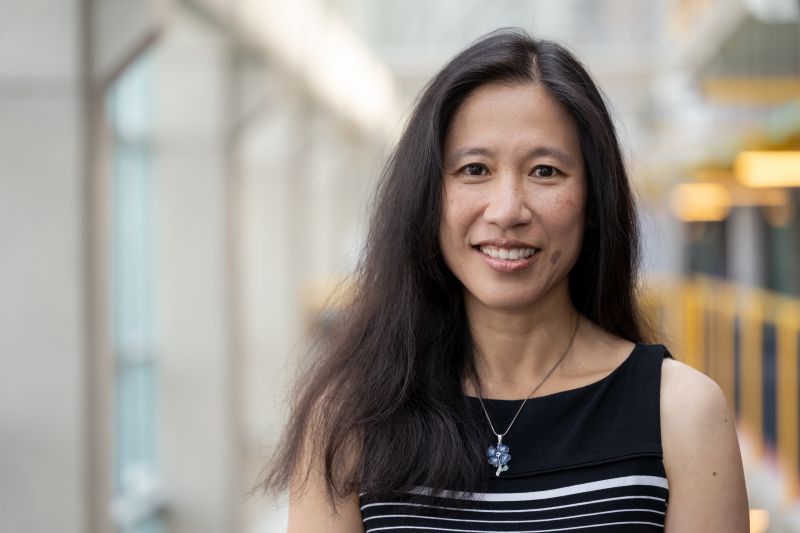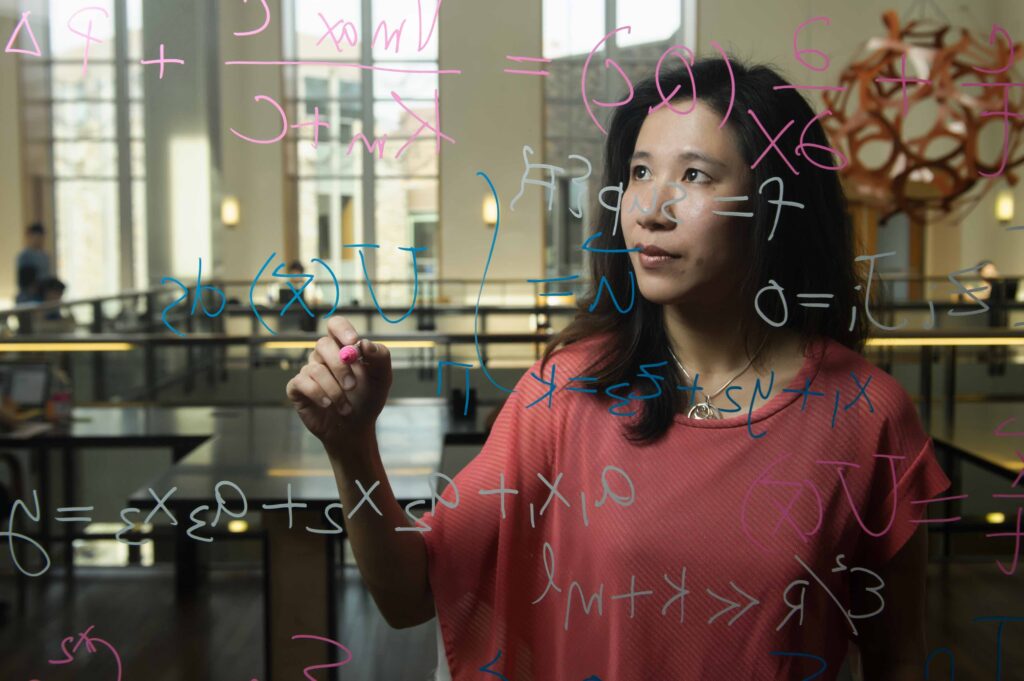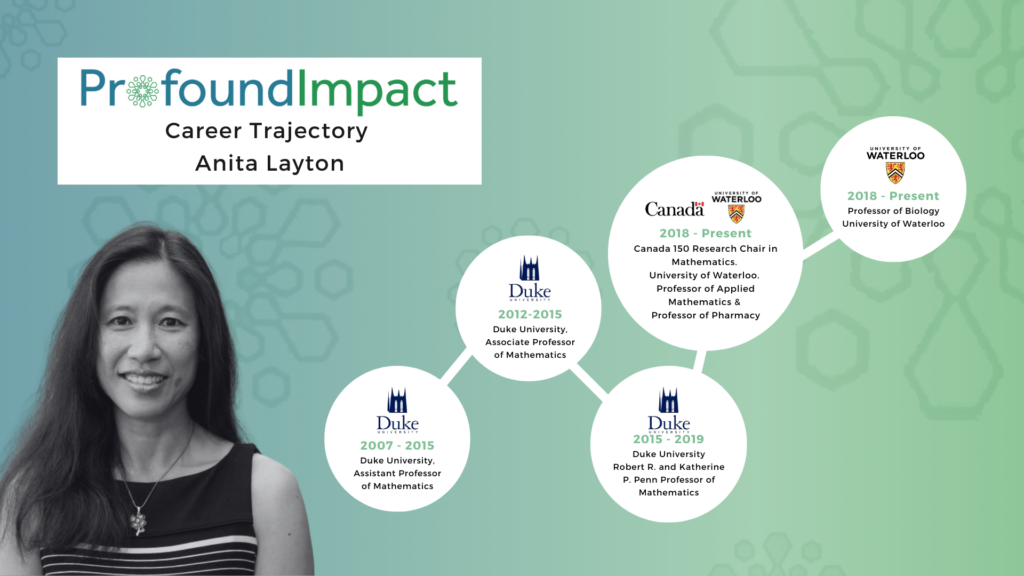Anita T. Layton


Professor of Applied Mathematics, Computer Science, Pharmacy and Biology
Canada 150 Research Chair in Mathematical Biology and Medicine
University of Waterloo
As the daughter of a mathematics teacher, it was assumed that Anita Layton would follow in her father’s footsteps to study math. “All of my father’s colleagues said, ‘You will be a mathematician like your dad.’ I was rebellious and didn’t know what I liked – but I knew that I didn’t want to do math because everybody expected that I would!”
Anita’s journey from Hong Kong, where she spent her first 18 years, to Duke University in North Carolina, was prompted by her father’s lifelong desire to complete a PhD degree in the United States. “His family was poor, so he took a job instead of pursuing graduate studies,” she says. “I was told, from a very young age, that I would earn a PhD in the US. My father chose Duke and I chose physics and computer science as my majors – even though I had never taken a computer science course before college. I hadn’t thought about majoring in computer science until I realized I couldn’t do experiments – I’m really clumsy. With computer science, if something isn’t right, there is no fire and nobody has to know. You can just go back and fix it!”
While Anita was completing her undergraduate degree in North Carolina, her family moved to Richmond Hill, a suburb of Toronto. She decided to pursue her graduate studies at the University of Toronto, completing a PhD in computer science on numerical weather prediction in 2001. Her first postdoc was at the National Centre for Atmospheric Research in Boulder.
Anita married Harold Layton, a mathematics professor at Duke University, in 2000, and wanted to return to North Carolina. She completed a second postdoc at Duke and then was hired as a tenure-track professor of mathematics there. “My husband was doing kidney research. I was tired of weather research after doing it for years and I wanted to work on anything but weather,” she says. She read one of her husband’s papers and noted that the kidney is about blood flow, which can be described with the same equations as the movement of the air in weather. “I thought – that’s cool. Maybe I can try my hand at it as a mathematical modeler even though I don’t know much biology,” she added.
Anita was a trained numerical analyst who used computers to solve mathematical equations very quickly, looking at other people’s models and systems of mathematical equations and working to solve them better, faster and more accurately. This skill, along with the biology she learned, eventually allowed her to build her own models. “I learned a lot about biology during that time. I attended biology meetings to meet people and to build professional relationships and was ultimately recognized as belonging to the research community,” she said.
Anita spent 16 years at Duke University, where she was the Robert R. & Katherine B. Penn Professor of Mathematics, and also held appointments in the department of biomedical engineering and the department of medicine. She was recruited to the University of Waterloo in 2018 as a Canada 150 Research Chair in Mathematical Biology and Medicine. Anita is currently Professor of Applied Mathematics, Computer Science, Pharmacy and Biology at the University of Waterloo and heads the Layton Group, a diverse and interdisciplinary team of researchers that use computational modeling tools to better understand aspects of health and disease.

Layton Group undergraduate, graduate students and postdocs collaborate with physiologists, biomedical engineers, and clinicians to formulate detailed models of cellular and organ function. She explains, “My research had focused on the application of mathematics to biological systems to understand the impacts of diabetes and hypertension on kidney function as well as the effectiveness of novel therapeutic treatments. My research has since expanded to focus on drug simulation and how some drugs work better in men than in women.”
Anita’s work as an internationally acclaimed authority and leading researcher in mathematical medicine and biology has been recognized by a range of organizations, including the Canadian Mathematical Society with the Krieger–Nelson Prize in 2021, the Women’s Executive Network as a Top 100 Most Powerful Women in Canada, by the Association for Women in Mathematics as a 2022 Fellow, by the Royal Society of Canada as a 2022 Fellow and 2023 John L. Synge Award winner and by the Federation of Chinese Canadian Professionals as 2023 winner of the Award of Merit.
In addition to her work as a renowned researcher, Anita is active in the research community. She is an Associate Editor of SIAM Review Book Section, an Associate Editor of SIAM Journal on Applied Dynamical Systems, a Section Editor (AI/Machine Learning) of Hypertension and an Associate Editor of Maple Transactions. She says, “I love research but for most of my career, I’ve also held substantial administrative positions. I was Chair of the Arts and Sciences Council for three years at Duke and served as the Associate Dean, Research and International, for the Faculty of Mathematics at the University of Waterloo. I like to improve things and took the Associate Dean to help promote my colleagues’ research.”
Equity, diversity and inclusion are also very important to Anita. She serves on, and chairs, the Research Equity, Diversity and Inclusion Council at the University of Waterloo. She has also been active with the university’s Women in Math initiative, which encourages and advocates for women and gender minorities who are interested in studying mathematics and who seek careers in mathematics. She says, “There are many reasons women are discouraged from studying math. Through the Dean’s Distinguished Women in Mathematics, Statistics, and Computer Science Lecture Series, we bring role models to speak to and with grad students. These excellent speakers, who also are renowned researchers and experienced mentors, are able to talk to and encourage those students.”
When asked what’s next in her career, Anita says, “I’m happy running my research program, but I want to do more to promote a supportive and rich environment for research and education in Canada. I’m especially interested in what I can contribute to science.”
Her advice to young people when considering what career to pursue is to “Follow your heart and your talent. Do something that keeps you happy and that you can do well.” For women in mathematics, Anita advises, “Keep your eyes open to find allies, both men and women, who can understand your concerns.”
Mathematics is the new microscope for Anita Layton and the members of her research group. Her work has inspired new experimental and clinical studies in renal physiology and related medical care, has constructed models to simulate new diabetes drugs, has highlighted the importance of sex differences in hypertension and has developed a new approach for diagnosing autism in children. And her passion for mentoring women and gender minorities and fostering diversity is a powerful demonstration of her commitment to the mathematics community at large.
